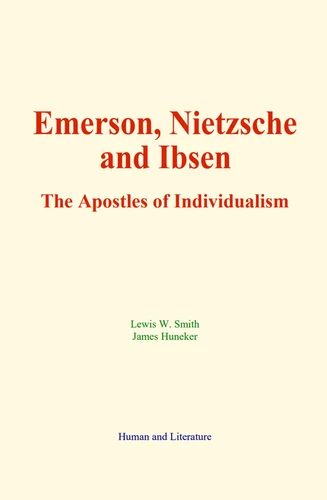Emerson, Nietzsche and Ibsen. The Apostles of Individualism
Par : ,Formats :
Disponible dans votre compte client Decitre ou Furet du Nord dès validation de votre commande. Le format Multi-format est :
- Pour les liseuses autres que Vivlio, vous devez utiliser le logiciel Adobe Digital Edition. Non compatible avec la lecture sur les liseuses Kindle, Remarkable et Sony
 , qui est-ce ?
, qui est-ce ?Notre partenaire de plateforme de lecture numérique où vous retrouverez l'ensemble de vos ebooks gratuitement
Pour en savoir plus sur nos ebooks, consultez notre aide en ligne ici
- FormatMulti-format
- ISBN978-2-38626-165-7
- EAN9782386261657
- Date de parution01/07/2024
- Protection num.NC
- Infos supplémentairesMulti-format incluant ePub avec ...
- ÉditeurHuman and Literature Publishing
Résumé
The development of various phases of individualism is one of the striking phenomena of the nineteenth century. We are not yet far enough away from it to be sure how it will look to our eyes when it has become somewhat definitely measurable as the actual past, but it is not a wild conjecture to think that it will then appear as the individualistic century. In the world of letters Ibsen, Emerson and Nietzsche were three of the more significant, not to say the three most significant, apostles of individualism.
They are interesting in comparison, because they represent quite different phases of the individualistic spirit and find their inspiration in somewhat different sources at the same time that they were contemporaneous and were each the product of a general tendency of their time. They illustrate that responsiveness to the common tone of an age that often surprises us in great men who have seemingly been not at all subject to the same specific influences.
There were three major subjects of human thought within which originated the presuppositions that were the foundation for individualism.
They are interesting in comparison, because they represent quite different phases of the individualistic spirit and find their inspiration in somewhat different sources at the same time that they were contemporaneous and were each the product of a general tendency of their time. They illustrate that responsiveness to the common tone of an age that often surprises us in great men who have seemingly been not at all subject to the same specific influences.
There were three major subjects of human thought within which originated the presuppositions that were the foundation for individualism.
The development of various phases of individualism is one of the striking phenomena of the nineteenth century. We are not yet far enough away from it to be sure how it will look to our eyes when it has become somewhat definitely measurable as the actual past, but it is not a wild conjecture to think that it will then appear as the individualistic century. In the world of letters Ibsen, Emerson and Nietzsche were three of the more significant, not to say the three most significant, apostles of individualism.
They are interesting in comparison, because they represent quite different phases of the individualistic spirit and find their inspiration in somewhat different sources at the same time that they were contemporaneous and were each the product of a general tendency of their time. They illustrate that responsiveness to the common tone of an age that often surprises us in great men who have seemingly been not at all subject to the same specific influences.
There were three major subjects of human thought within which originated the presuppositions that were the foundation for individualism.
They are interesting in comparison, because they represent quite different phases of the individualistic spirit and find their inspiration in somewhat different sources at the same time that they were contemporaneous and were each the product of a general tendency of their time. They illustrate that responsiveness to the common tone of an age that often surprises us in great men who have seemingly been not at all subject to the same specific influences.
There were three major subjects of human thought within which originated the presuppositions that were the foundation for individualism.



